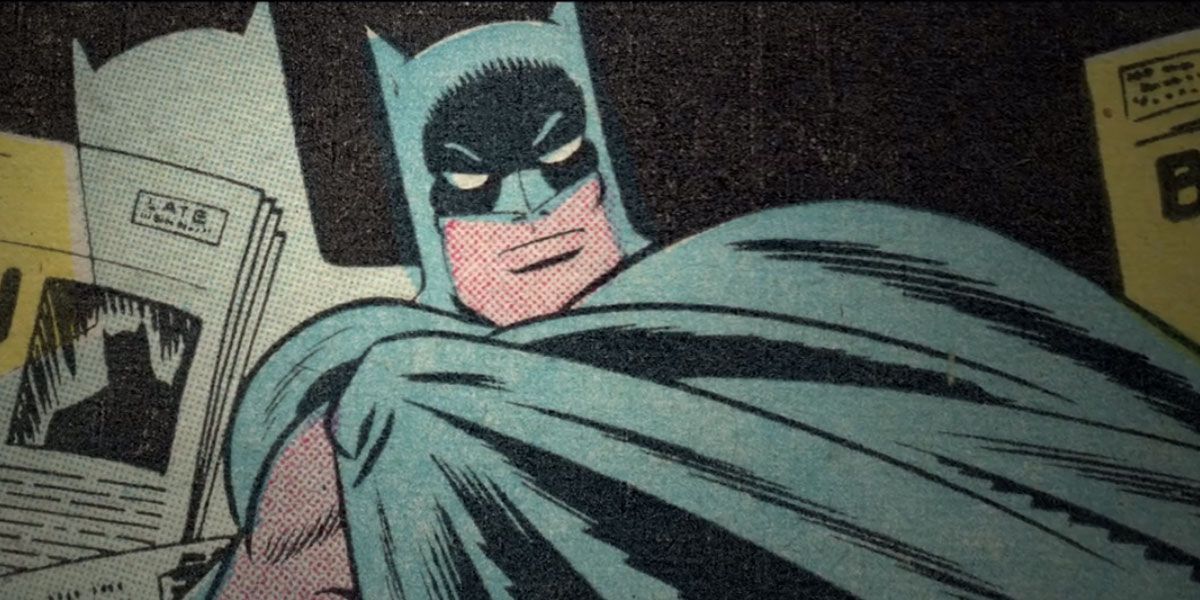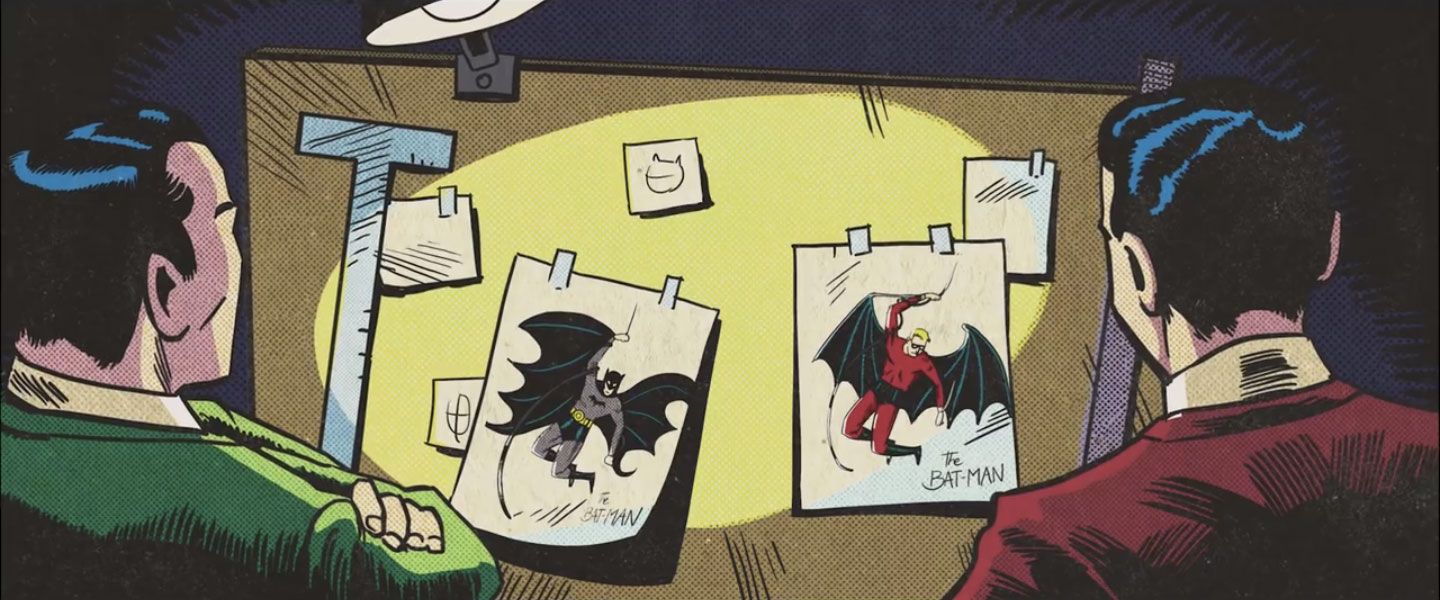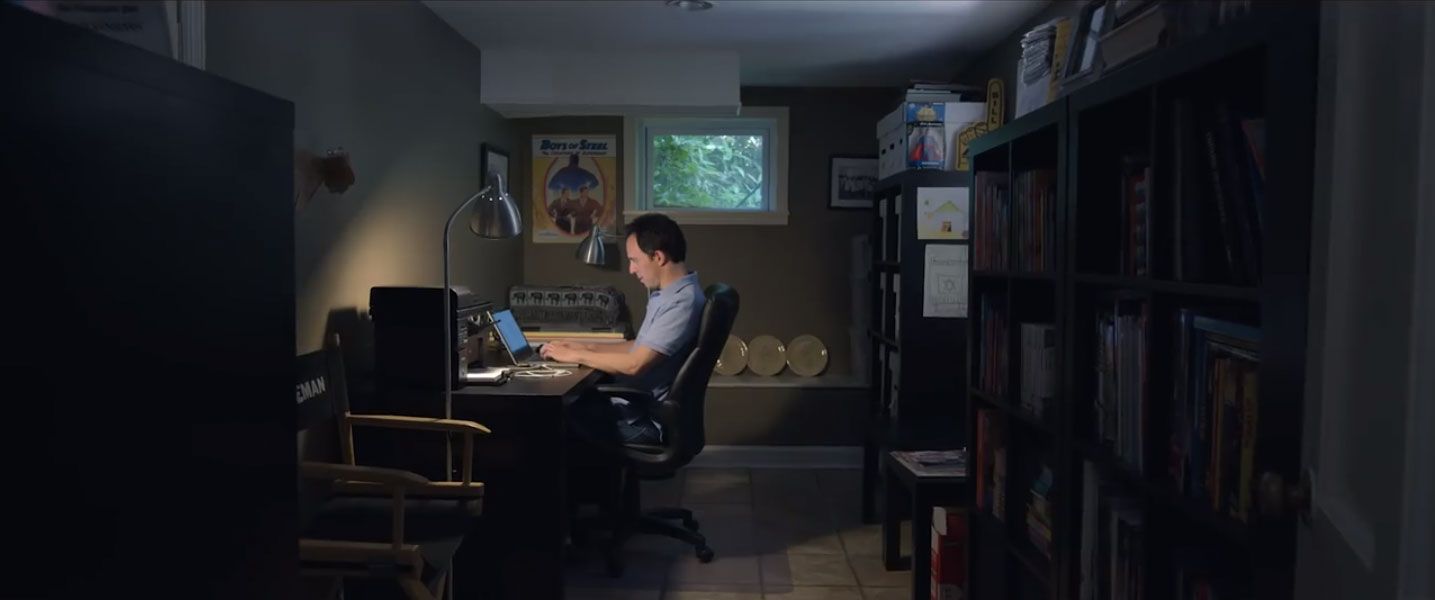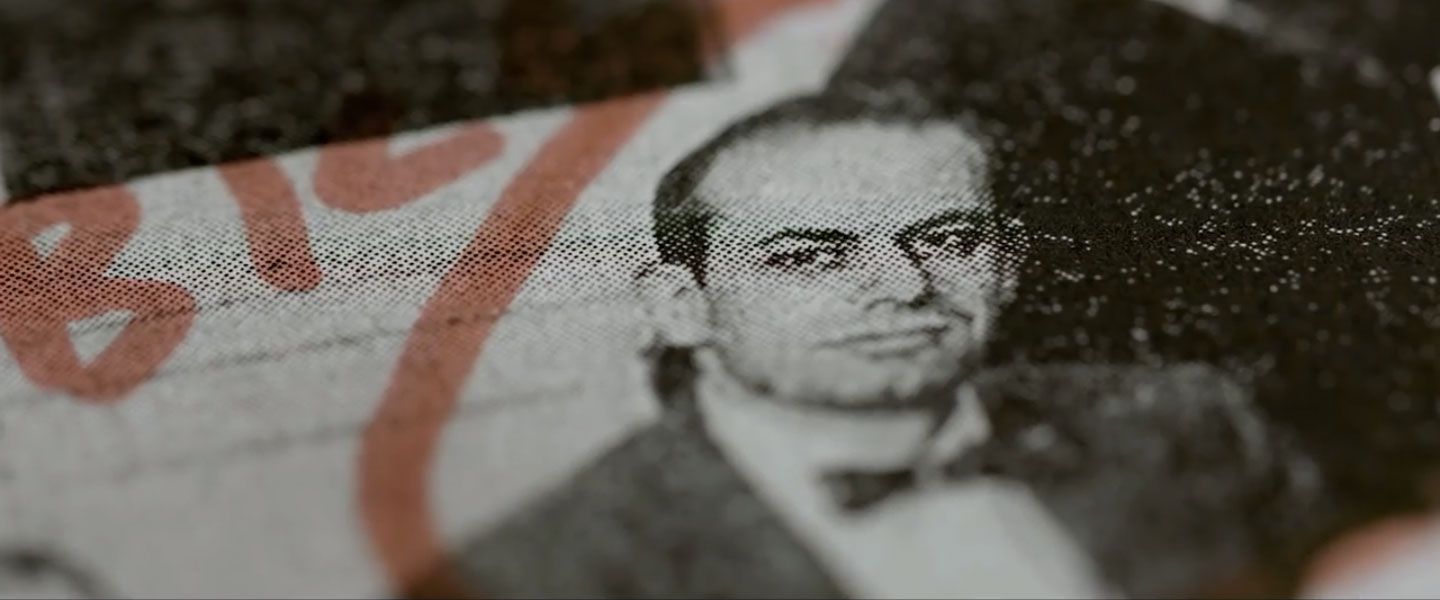For three-quarters of a century, writer Bill Finger was the unsung hero behind the creation of one of the most famous and commercially successful superheroes of all time: Batman. And then one day, thanks to the dogged efforts of author Marc Tyler Nobleman, Finger’s contributions were finally -- and officially -- recognized.
The new Hulu documentary “Batman & Bill” doesn’t simply recount the poignant and frustrating story of Finger’s life and career, now a legendary tale among comic book aficionados: in the late 1930s, Finger had begun what would become a prolific and storied vocation as a writer, ghostwriting features for his friend, comic book artist Bob Kane.
In 1939 Kane was tasked by National Comics, the precursor to DC Comics, to create a character to build on the success of its debut superhero, Superman. Kane borrowed inspiration from a DaVinci sketch for a bat-wing vigilante, but it was Finger who dreamed up many of the trademark trappings -- including the dark color scheme, the pointy-eared cowl and scalloped cape and gloves, the Batmobile, the Batcave and, especially, his Sherlockian sleuthing abilities.
Kane had the savvier legal sense and a canny -- and oft overzealous -- penchant for self-promotion, however, and negotiated sole creator credit, mandatory byline and a significantly lucrative stake in Batman’s profits, while Finger settled for a modest ongoing role as Kane’s go-to ghostwriter. Known for keeping seemingly inexhaustible files full of fodder for story springboards, Finger kept busy for decades writing comics for virtually every major publisher -- as well as pulp novels, B-movie screenplays and TV scripts for series including the 1966 “Batman” -- until his death in 1974 at age 59.
As “Batman & Bill” reveals, it was writer Marc Tyler Nobleman who began shining a broader spotlight on Finger’s contributions to the Batman mythos with his book "Bill the Boy Wonder," a project that eventually snowballed into a full-on crusade to have Finger’s work formally acknowledged by DC Comics and its parent company Warner Bros. -- and, as it turned out, to provide some financial consideration to the heirs few were aware Finger had, until Nobleman went looking for them.
The documentary is a rousing underdog story with dramatic twists and turns and a killer ending, as comic fans who’ve noted that Finger has shared credit with Kane on all Batman projects since late 2015 -- including the TV series “Gotham” and the film “Batman v Superman: Dawn of Justice” -- can attest. Nobleman joined CBR to share his side of his unexpectedly epic quest to see justice done, as he sees, from one writer for another.
CBR: What a journey this was for you. What kept you going?
Marc Tyler Nobleman: I think that’s just my DNA. This turned out to be a big story, but I’m like this with anything that I’m passionate about. I just keep going until I get what I think I want, or get as far as I think I can get, without creating an incident. So this was just something that I felt passionate about, not just for my career, and not just as a comics man, but I felt like there was this larger, cultural obligation to do it, and no one else had stepped up, so I thought, “I’ve got to follow through.”
Partly because there was a group of people that knew Bill Finger personally who were in their golden years -- in their 80s, and some cases their 90s. They were the last people that we could talk to who knew him personally. So I felt this cultural obligation to talk to them and get as much as we could before they’re gone. I interviewed nine people who worked with Bill and Bob personally, and all nine are now gone.
What was it about Bill Finger’s story that, on a personal level, reached you, touched you and inspired you to do this?
That’s the funny thing. Before I started, I didn’t know his personal story. I just knew the broad strokes.
Which was all anybody knew.
That’s all anybody knew. So that alone was enough to make me want to pursue this, because it’s Batman. This guy should have been recognized for decades. But once I started to know him as a person, like any writer, you’re a writer, as any writer gets closer to his subject, you just develop more of an empathy for that person. Even though I’ll never know him as fully as I want to, but just fleshing him out did make this more of a “one writer trying to do a solid for another writer” type thing.
What were the things about Bill that you found yourself admiring? He had an often tough existence, even though he was doing something he clearly loved to do
That becomes tricky because, like any good hero in fiction, he’s not flawless. So there are sides of them that are hard to be sympathetic about. Most people I talk to that hear the story want him to have pushed harder, and I’m one of those people. He may have, and it just may not have been documented.
I found out as much as I think we’re going to find out about what he did to try to help himself, and it wasn’t enough. Not just because it didn’t help him in his lifetime, but because it was barely even documented. So there’s almost more to be critical of, in a sense, than to be positive about when it comes to his personality, because this was something that you just feel like this guy should have had this before he died, and he didn’t. Is it mostly his fault? Or was he just a victim of circumstances beyond his control?
But what I liked about him is just that he was relentless in his creative life. He was so prolific, not just with Batman, but across almost every major character of his day. He seemed to be one of those “Greatest Generation” type guys, two generations before the Greatest Generation, that you do these amazing things, but you don’t brag about them. So he was apparently quite modest. He’d talk about Batman, but he wasn’t Bob Kane. He wouldn’t shine the spotlight on himself every chance he got.
The more you know about Bill Finger’s story, the less off the pedestal you have to keep putting Bob Kane and his role in the creation of Batman. Tell me about your thoughts on Bob and that issue.
Yeah. I’ve said since the start that my goal was not to tear down Bob Kane, but rather to build up Bill Finger. But to build up Bill Finger, you by definition almost have to tear down Bob Kane, because you’re chipping away at this myth that he built around himself. So I don’t have positive things to say about Bob.
The best I can say is that he did, at the end, not at the end, but in ’89 in his autobiography, he did allow himself to give Bill credit for the first time. But it wasn’t even his own, it didn't come from his own heart, because his ghostwriter, Tom Andre, pushed him. And apparently pushed him a bit too much, and Bob said, “We’ve got to back off on the Bill Finger stuff.”
But, to both Tom and Bob’s credit, it is in the book. It is in his autobiography that Bill Finger was the unsung hero. But beyond that, for me, he just doesn’t have redeeming qualities as a professional. Personally, I’m not judging him. I didn’t know him. I’ve met friends of his, and they speak about a different type of person. That may be. But for my frame of reference, what he did professionally, it’s inexcusable.
When the Finger story prevailed, it was a game-changer: it was a game-changer for his family, it was a game-changer for comics history, and a game-changer potentially for the industry and for some of these creators who were left behind. And now these characters are huge intellectual properties that are generating millions and billions of dollars. Tell me about that: to know that you pushed over the first several dominoes to make that happen.
That’s nice of you to say it that way. I still feel like, at the core, it’s just one writer trying to help another. But yeah, I see what you’re saying. There have been intellectual property successes before this, but not, as you noted, not on this scale. Batman is, by some sources, the most successful superhero of all time. I think he’s one of the most successful fictional characters of all time.
But I wasn’t the first to try to do something like this, but this just became the most high-profile story of it, I would say. In that sense, it feels very gratifying. As a writer myself, it just feels gratifying to know that we live in a modern world where it might be too late for the person himself to benefit, but at least there are people out there that want to do the right thing.
DC Comics, the people that are there now, they are fans first. Most of the people that work at these companies now, they were fans first. Unlike these guys, which they were building the industry. We’re all in their wake. So I do believe that there was this desire for this, and it just took an outsider to push for it.
That came through very strongly in the film, that the people within DC Comics wanted to welcome it, but there was a limit.
Yeah, because they’re two people in one. They’re fans first, but they work for a big corporation. So there’s only so much that any one of them would have been able to probably put on the line to push for this. But I was not at DC, I was not in the Finger family, I was the perfect person to come in and push from different directions, because I had really nothing to gain or lose.
There are two parallel moments in the movie that I just love: one was when Bill Finger got his name first credited on his Batman episode; the other was when you, Marc, go to see “Batman v Superman” and see that on screen credit for Bill. Tell me about the juxtaposition of those moments, and then your feelings when you saw that.
I don’t know how much it shows on my face, but it was very moving. It wasn’t the first time I saw his name in credits, because it was in “Gotham” before that and comics. But it was, obviously, the biggest platform, the biggest property at that time. So that was very moving.
But still, it doesn’t compare to the day that I found out, which was not being filmed. I was alone in my house. I was just overcome. I feel like I was being pulled in every direction at once, in a good way. This thing that I’d been pushing for for nine years happened, and all along I was optimistic, but I was also realistic. So I never actually stopped to think about, “What’s this going to mean if it actually happens?” So I was totally taken aback by that.
But seeing it in the film, I knew it was coming, unlike the day of the credit announcement, I didn’t know the exact way that that was going to play out. So it was a big deal, but it wasn’t the biggest deal.
Weirdly, about “Gotham,” I looked for it weeks after the announcement and didn’t see it, because it’s not the front credits. It’s in the end credits. I didn’t even look there.
So do you have a new crusade? This one took up so much passion, energy and time. Have you been able to plug something into its space? I was worried about you!
Thank you.
“What does he do now?”
Yeah, that’s very compassionate of you. I have plenty of other projects in the works coming up, but nothing like this. And probably, realistically, nothing will ever be like this again for me. This is such a unique situation, so I’m not counting on that.
I’m so thrilled to have been a part of this story. I don’t expect to recreate it. But I just want to continue to write about things that I’m passionate about. Sometimes it’s going to be much quieter stories, but you never know.
Will it be still in the comic book field, or do you want to go into some different territory?
This and the Superman book that preceded it, “Boys of Steel” about Siegel and Shuster – I’ve written about 75 books, and those are my only two superhero books. So to answer your question, I don’t plan to write more books like this. I would love to write comics, and I wrote a few for DC a few years ago, which was fun. But I’d love to do more of that. Beyond that, I’ve got a long list of things I want to write, and I’ll never finish.
When did Bill Finger first hit your radar as a creative force? Was there a moment that you remember learning about him? Maybe not the controversy, but just Bill and his talent, and how prolific he was.
You’d think I’d remember, but it predated the beginning of the research by years. So in other words, it wasn’t like I was already keeping track of the timeline of the book, because it wasn’t an idea yet. When I read about him for the first time, I was surprised, but that wasn’t my inspiration. It didn’t happen that first day. I think it was, there was a Wizard Magazine article around 2002 by Jim McLauchlin about Bill Finger, and that may have been when I first learned of him, but I’m not sure.
Have you read a lot of his work outside of the Batman territory? Had you explored a lot of Bill’s writings for other characters?
I actually did not, because the real-life research was just so all-consuming. I’ve read plenty of his work, but I didn’t go read his Captain America stories. I didn’t read his carpentry articles -- I didn’t even find any. I didn’t read his B-movie scripts. That wasn’t necessary for me to write this and to do what was doing.
Eventually, I’d like to at least see “The Green Slime.” I’ve never seen “The Green Slime,” one of his B-movie scripts. And I’d love to track down some of his more obscure stuff. Not comics, but just for fun.
He was all over the place!
He really was. Like I said, he wrote radio serials, he wrote TV shows, he wrote carpentry articles, he wrote training films for the military. He was a renaissance guy when it came to writing.
You mentioned that you weren’t really a family member, but you have to be sort of a Finger family member at this point on some unofficial level.
You’d have to ask them! I feel like I’m part of the family. Athena is a good friend. I’m looking forward to seeing her here. I’m always going to want to maintain that. This is their family. This is their family story. This is their birthright, and I’m so thrilled that I had some role in getting Bill credit.
I want them to enjoy this and celebrate this as a family, and I’m happy to be included in what I’m invited. I’m happy with whatever role I can play going forward in the family.
A fiction writer would be working hard on their best day to find somebody like Athena Finger to plug into the story that you were already working on. To see how her story, in so many ways, paralleled Bill’s struggle, and the family’s struggle. Everything was distilled down into her person, I felt like. Tell me about meeting her, and seeing her -- both symbolically and as the real Athena -- affected you.
That’s a great question that you have to look at it through the lens of the moment, which was, this was 2007. I researched and wrote this book on spec. Nobody hired me. I never knew that I would sell it. I never knew if I would make a dime on all this. So when I found Athena, it was a big moment, and I felt that it was bigger than any one person.
But at the same time, I was alone in the woods. It isn’t like I could go to an editor and say, “Great news – big find!” I was still man alone. So I felt like I knew this secret that everybody should know – there’s an heir – and I didn’t quite know how to process that. I couldn’t give away too much in advance, because I still wanted to do this. But I also didn’t want to keep it to myself, so it was new territory for me.
So I met her in person about a month after we first connected online, because I happened to be going to Florida where she lives. The trip was already planned, unrelated to her. I didn’t even know that I would be finding her, and that she would live in south Florida. And I was in Orlando, and she was in the Miami area. So it was a good four-hour drive to go meet her. I was with a good friend of mine. And it was definitely very heightened – I was very excited to meet her. Even though she never knew Bill, she’s not directly involved with Batman, it felt like I was meeting history, really.
And her son was with her too. At the time, he was five years old. So it was shock enough to find out Bill had a living heir, but he actually had two living heirs, and I met them both in one fell swoop. So it was very profound for me. I think we both felt this, I think she was quite grateful that someone cared about her family, and cared about this story, and I was so thrilled that she was willing to talk about it.
Some people would say, “Thank you for getting in touch, not interested,” or ‘We’re going to take it from here.” She wasn’t like that. She was very much like “I want to be a part of this. How can I help you?” She was really great about it from the beginning.
Was there anything on your part of like, what if I get her into this and it ends in heartbreak?
That happened right away. Almost immediately there was a whole family story that I was not privy to that this reopened. The relationship between Athena and her father, Bill’s son. I didn’t know anything about that. Me coming in and pushing her to contact DC and pursue this opened up this this situation that she had with her dad, and how her dad died when she was a teenager. There was just a lot of personal emotion in this that was beyond what I was expecting to be tapping into for a book like this.
So right at the beginning Athena’s mom called me and said, “I’d like you to talk Athena out of contacting DC Comics, because I know you’re just a writer doing your job.” Her words were, ‘You don’t know the havoc that you’ve caused in our family. I know you didn’t mean it, and it’s all with good intention, but there’s a lot of emotion here that this is going to dredge up.” That’s why she wanted me to talk Athena out of doing this.
And I said, ‘Totally understand that. I’m a parent myself. I respect that. But in my good conscience, I can’t do that. I can’t tell her not to do something that I fully believe she should do.” And I was probably a little nervous to say that, because yeah, what if this all went south? What if this created more trauma for Athena emotionally? What if she pursued this and lost?
Yeah, I recognize that. I don’t know how I would have felt. I don’t think I would have felt that it was all on me. But I would have felt some sense of responsibility. I’m a naively optimistic person. I thought, “If we’re going to follow through on this, let’s just make it happen.” So I felt like, “Okay, let’s just jump in.”
Now that a moral victory has been achieved -- and I’m hoping a significant financial victory has been achieved for the family as well -- are you happy with where you feel they’ve ended up in their journey?
I want them to be happy, and they tell me they’re happy, and I’m happy with that. So what we all wanted uniformly was credit. First and foremost, nothing without credit, and we got it. Everything else is gravy. So I’m thrilled with what happened. Like you said before, to be a part of something that does have an effect on comics history is extremely humbling and gratifying.
It’s been amazing to see these changes: Siegel and Shuster, Jack Kirby and now Bill Finger -- I genuinely never thought these things would happen.
Most people didn’t. In fact, I don’t know if I say it in the movie or in the book, but people in comics point-blank said to me, when they heard what I was doing, “Don’t waste your time. “ Most people were supportive, but there were a handful that weren’t. They didn’t even think it was worth it to be supportive, because it was just so unlikely.
I don’t fault them for that. I get it. It just seemed unlikely. But me as a fan first would say, “Look, if you want to pursue this, good on you. I’m right behind you.” I think, “Let’s go for it,” not that the odds are against you.
Not to make too much of the parallel, but that’s what superheroes do. They’re out there fighting without wanting praise or getting paid for it. They’re just trying to do the right thing because it’s the right thing. It might not work, but you support them for trying. So I was hoping for that reaction from people, and most people were like that, but a few weren’t. It was a little jarring, I have to admit. But also now makes for a more reflective story.
You’ve got to be an underdog.
Right. Yeah. If it’s too easy of a win, no one’s going to root for you.
"Batman & Bill" is available now on Hulu.




